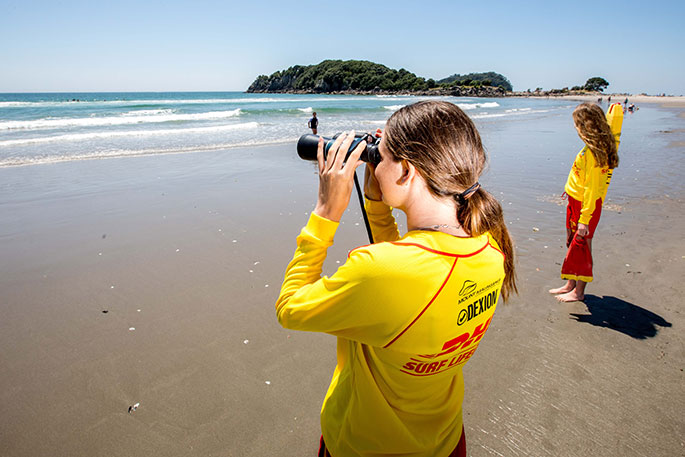With the surf lifesaving season officially starting this weekend, Surf Life Saving New Zealand asks the public to be patient and work with them to maintain safe beaches.
The season officially launches this Saturday.
Labour weekend is the traditional start to patrol season for most areas of the North Island, predominantly across Auckland along with beaches in Northland, Waikato, Coromandel and the Bay of Plenty.
In other parts of the country, patrols will begin in the coming weeks as the weather and water conditions get warmer.
This year the surf lifesaving patrol season kicks off with the added difficulty of lifeguards operating under Covid-19 restrictions.
"There has been a tremendous amount of work going on to provide advice to clubs on how they are going to operate safely at the different alert levels," says Surf Life Saving New Zealand CEO Paul Dalton.
"Clubs and members will be at the beach, but it might be a bit different to previous years in terms of the lifesaving service provided in some areas."
Surf Life Saving National Club & Volunteer Development Manager Chris Emmett says many beaches will function in the normal way, with flagged areas and lifeguards patrolling.
"However, some clubs will have reduced staffing or may have decided not to patrol due to Covid complications and availability of club members."
This means that the public may not see the familiar red and yellow flags as clubs may be operating observational patrols, with lifeguards in the towers, due to reduced capacity.
In these instances, the public should take extra caution in the water. If conditions are too dangerous for the public and the lifeguards, beaches may be 'red flagged', which means 'no swimming' and the public should not enter the water.
Reduced staffing is being experienced by some Coromandel clubs that can't get their members out of Auckland under the current Alert Level 3 restrictions.
Another factor having an impact on the availability of club members is their personal circumstances.
"Some people may be making decisions because they have vulnerable family members in their bubble and don't want to be exposed to the wider area."
Surf Life Saving New Zealand urges beachgoers to look at where surf clubs are patrolling, go to a safe spot and adhere to the Covid-19 physical recreation guidelines for their area.
The public can find out which beaches are patrolled by checking with their local surf lifesaving club, and Aucklanders can refer to the Safeswim website.
Dalton is asking the public to be patient and work with SLSNZ to maintain safe beaches.
"Please remember it will be a volunteer lifeguard service over Labour weekend. Many areas patrolling this Labour weekend are in Alert Level 3, the Auckland and Waikato regions.
"If possible, go where there is a lifeguard presence and find the flagged area as the safest place to swim. But if you're in doubt about the conditions or area, please stay out of the water."
Beach Safety Messages
-
Choose a lifeguarded beach and swim between the flags
-
Read and understand the safety signs – ask a surf lifeguard for advice as conditions can change regularly
-
Don't overestimate your ability or your children's ability to cope in the conditions
-
Always keep a close eye on very young children in or near the water – always keep them within arm's reach
-
Get a friend to swim with you – never swim or surf alone
-
Watch out for rip currents, they can carry you away from shore. If caught in a rip current remember the 3Rs: *Relax and float, *Raise your hand and *Ride the rip
-
Be smart around rocks: When fishing never turn your back towards the sea and always wear a lifejacket
-
If in doubt, stay out!
-
If you see someone in trouble, call 111 and ask for the Police
-
Be sun smart – slip, slop, slap and wrap to protect your skin and eyes from the sun's damaging rays.



0 comments
Leave a Comment
You must be logged in to make a comment.